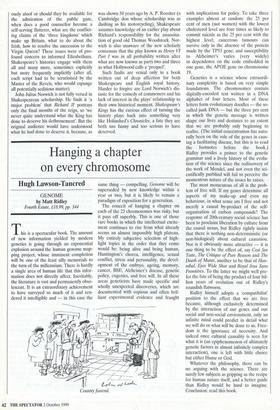Hanging a chapter on every chromosome
Hugh Lawson-Tancred
GENOME by Matt Ridley Fourth Estate, £18.99, pp. 344
This is a spectacular book. The amount of new information yielded by modern genetics is going through an exponential explosion around the human genome map- ping project, whose imminent completion will be one of the least silly memorials to the turn of the millennium. There is hardly a single area of human life that this infor- mation does not directly affect. Inevitably, the literature is vast and permanently obso- lescent. It is an extraordinary achievement to have surveyed so much of it and ren- dered it intelligible and — in this case the
same thing — compelling. Genome will be superseded by new knowledge within a year or two, but it is likely to remain a paradigm of exposition for a generation.
The conceit of hanging a chapter on each of the 23 chromosomes was risky, but it pays off superbly. This is one of those rare books in which the intellectual excite- ment continues to rise from what already seems an almost impossibly high plateau. My entirely subjective selection of high- light topics in the order that they come would be: being alive and being human, Huntington's chorea, intelligence, sexual conflict, stress and personality, the devel- opment of the embryo, ageing, memory, cancer, BSE, Alzheimer's disease, genetic policy, eugenics, and free will. In all these areas geneticists have made specific and wholly unexpected discoveries, which are documented with copious and often bril- liant experimental evidence and fraught Country funeral with implications for policy. To take three examples almost at random: the 25 per cent of men (not women) with the lowest cholesterol level are four times as likely to commit suicide as the 25 per cent with the highest level; cancerous tumours can survive only in the absence of the protein made by the TP53 gene; and susceptibility to Alzheimer's varies (very widely) in dependence on the code embedded in one gene, the APOE gene on chromosome 19.
Genetics is a science whose extraordi- nary complexity is based on very simple foundations. The chromosomes contain digitally-encoded text written in a DNA alphabet of four letters. Most of these letters form evolutionary doodles — the so- called junk DNA — but the three per cent in which the genetic message is written shape our lives and destinies to an extent that we are probably only beginning to realise. (The initial concentration has natu- rally been on the role of the genes in caus- ing a facilitating disease, but this is to read the footnotes before the book.) Ridley provides a primer to the genetic grammar and a lively history of the evolu- tion of the science since the rediscovery of the work of Mendel, and not even the sci- entifically purblind will fail to perceive the momentous nature of the issues he raises.
The most momentous of all is the prob- lem of free will. If my genes determine all aspects of my make-up and even my behaviour, in what sense am I free and not merely a causal by-product of the self- organisation of carbon compounds? The response of 20th-century social science has been to proclaim liberation by culture from the causal nexus, but Ridley rightly insists that there is nothing non-deterministic (or non-biological) about cultural causation. Nor is it obviously more attractive — it is one thing to be the effect of, say Cosi fan Tutte, The Critique of Pure Reason and The Death of Murat, another to be that of Han- nibal, Eyes Wide Shut and Royal Jeur Sans Frontieres. To the latter we might well pre- fer the fate of being the product of four bil- lion years of evolution out of Ridley's roundish flatworm.
Ridley himself adopts a `compatibilise position to the effect that we are free because, although exclusively determined by the interaction of our genes and our social and non-social environment, only an infinite mind could predict in detail what we will do or what will be done to us. Free- dom is the ignorance of necessity. And indeed once cultural causality is seen for what it is (an epiphenomenon of ultimately genetic factors in almost infinitely complex interaction), one is left with little choice but either Hume or God.
Whatever the philosophy, there can be no arguing with the science. There are surely few subjects as gripping as the recipe for human nature itself, and a better guide than Ridley would be hard to imagine. Conclusion: read this book.










































































 Previous page
Previous page